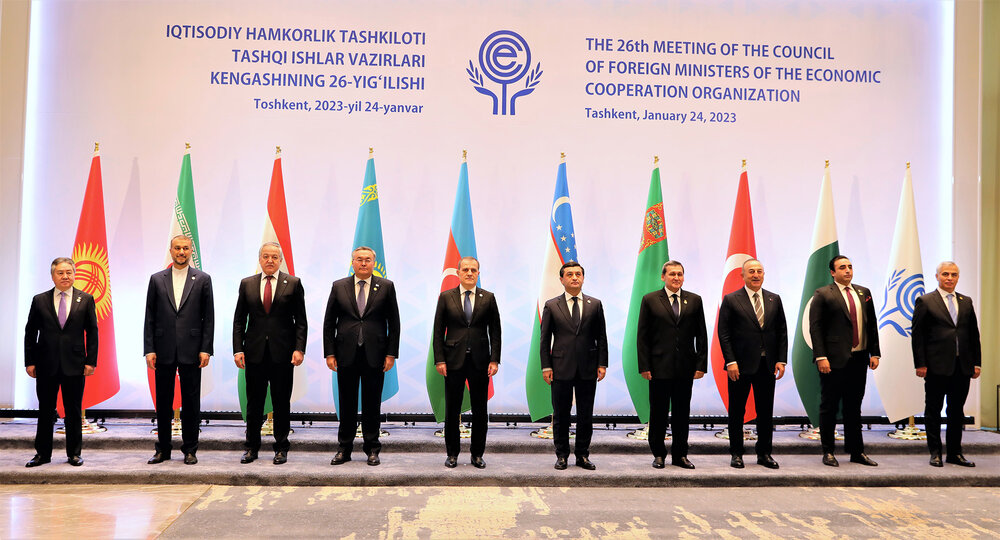ECO should promote intra-regional trade between members: FM
'EU emotional behavior will be costly for Europe'

TEHRAN – Iranian Foreign Minister Hossein Amir Abdollahian attended on Tuesday the ministerial meeting of the Economic Cooperation Organization (ECO) in Uzbekistan's capital and delivered a speech in which he criticized the European Union for its emotional behaviors.
In his speech, Amir Abdollahian touched on many issues including intra-regional trade, connectivity, energy, innovation, and the situation in Afghanistan.
“ECO should promote intra-regional trade between members. So far, this has been less so, and trade between members has not received sufficient support from ECO's trade mechanisms. I suggest and request that all members, and not just the 5 member countries of the ECOTA trade agreement, support and participate in the initiation of negotiations for trade liberalization at the regional level,” he said.
Amir Abdollahian stated, “Transportation is one of the drivers of convergence and collective development and prosperity of the economic capacities of the region in the coming years. As a region, ECO is a transit route to connect peripheral regions including East and South Asia, North and Eastern Europe, and the south of the Persian Gulf.”
He also addressed the energy security crisis that is currently racking the world. “The current energy security crisis in the world and the region has clearly revealed the vulnerability of energy consuming countries to unexpected shocks. Climate changes and recent winter cold have also highlighted the vulnerability of some energy producing countries. The ECO region can become a model of partnership between energy producing countries and energy consuming countries. Undoubtedly, participation in the gas and electricity sectors is one of ECO'S priorities in this regard,” he said, adding, “I would like to point out the initiative of the honorable presidency of the Islamic Republic of Iran under the title ‘Gas in the service of the recovery of the global economy after Covid’, which was presented in the assembly of gas exporting countries. This initiative can also be the basis for participation in the ECO region.”
The Iranian foreign minister continued, “ECO needs more and more investment in the field of new technologies, knowledge-based industries and digitalization of economic activities. The Islamic Republic of Iran is ready to share its achievements in knowledge-based fields with ECO member countries.”
He pointed out that Iran has always welcomed initiatives and proposals that lead to strengthening the role and position of ECO in the economic development of member countries. In this regard, "strengthening the sense of belonging to ECO" is very key among the private and public sectors as well as the elites of the member countries and above all among the people of the region, he added.
Amir Abdollahian noted, “We also need the presence of all 10 member countries in the ECO cooperation mechanisms and arrangements. This can, and should, be one of the achievements of the fourth decade. In this ministerial meeting, the creation of two new cooperation mechanisms, including the establishment of the ‘ECO Natural Disaster Risk Management Regional Center’ in the Republic of Iran and the ‘ECO Clean Energy Center’ in the Republic of Azerbaijan, are on the agenda. We expect all members to support their creation and join them.”
All-inclusive government in Afghanistan needed
Amir Abdollahian also addressed the situation in Afghanistan and underlined the need for the formation of an all-inclusive government in the war-torn country.
“Afghanistan is a very important member and part of the big ECO family. The Islamic Republic of Iran was one of the main countries in designing and approving the ‘ECO Support Policy for Afghanistan’ and has always supported the necessity of its full and effective implementation. This support is in addition to bilateral aid to solve the problems of the noble people of Afghanistan and prevent humanitarian crises,” he said.
The Iranian foreign minister added, “Undoubtedly, the establishment of an inclusive government in Afghanistan can not only help the aid programs and reconstruction of the country, but it will also reduce the threats caused by terrorist operations, refugees and drug trafficking for the region.”
He said, “We consider the action of the ruling body of Afghanistan in depriving women and girls of education, an action in conflict with the teachings of the merciful religion of Islam, and we express our deep concern about it.”
Iran respects human rights
Amir Abdollahian also underlined Iran’s adherence to its global obligations. “In addition to responsible approaches in regional frameworks, the Islamic Republic of Iran adheres to its obligations in the global arena. Among other things, in the framework of national and Islamic foundations and principles, the constitution and international commitments, attention to human rights issues is among the priorities of the Islamic Republic of Iran. It always welcomed and welcomes dialogue in the framework of mutual respect and meaningful interaction with serious partners,” he said.
He noted, “The foreign policy of the Islamic Republic of Iran is based on the doctrine of balanced foreign policy, interaction and cooperation with the world and non-interference in internal affairs. We strongly condemn the adoption of the interventionist and unconventional resolution by the European Parliament. Undoubtedly, the negative consequences of such emotional behavior are costly for Europe, and therefore the right path is to focus on diplomacy, constructive interaction and rationality.”
Amir Abdollahian also condemned the desecration of the Holy Quran in Europe. “The Islamic Republic of Iran does not consider the insulting behavior towards the sanctities of divine religions, especially the insulting of the Holy Quran and the Western governments' support for it under the title of freedom of expression, to be acceptable in any way and strongly condemns it,” he said.
